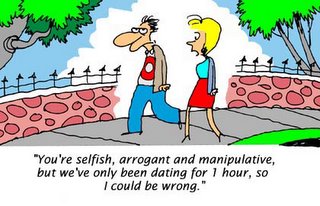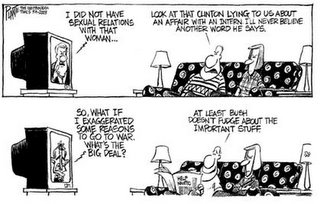2/07/2006
Western arrogance
 The case of the Danish cartoons is a very interesting one for discourse analysis in relation to intercultural contact. Yesterday at once the Internet discussions seemed to burst out everywhere: at different places at Orkut, at my weblog, in a philosophy discussion list that I’m a member of and at msn (but that was before).
The case of the Danish cartoons is a very interesting one for discourse analysis in relation to intercultural contact. Yesterday at once the Internet discussions seemed to burst out everywhere: at different places at Orkut, at my weblog, in a philosophy discussion list that I’m a member of and at msn (but that was before).
It is strange I think, that at once the phenomenon that I have been protesting against all the time seems to be popping up everywhere. The phenomenon I refer to is the process of dehumanization of the other, the stranger, as described by Levinas, a process which is in this case caused by phenomena like racism, xenophobia, bigotry, fear and hate and which shows itself through simplistic generalizations, exaggerations, irrational anger, aggression, discrimination, exclusion, and immorality.
 This process is happening at “both sides” – both with non-western Muslims and Western non-Muslims. The broad reaction of anger and the threats with violence are clearly being noticed by “the West” and they are strongly being rejected, which is logical and good. But what fascinates me is that I almost don’t find any attempt to nuanced critical reflections, modesty and self-criticism in the West, in the discussions I have read so far.
This process is happening at “both sides” – both with non-western Muslims and Western non-Muslims. The broad reaction of anger and the threats with violence are clearly being noticed by “the West” and they are strongly being rejected, which is logical and good. But what fascinates me is that I almost don’t find any attempt to nuanced critical reflections, modesty and self-criticism in the West, in the discussions I have read so far.
I noticed a kind of obsession for an unlimited freedom of speech, based on a fear that non-Westerners are going to determine for us what we are allowed to say and do and what not. A fear that in the future we will no longer be able to say what we think. A fear that if you decide to take others into account with what you say, you would restrict yourself too much by not always saying exactly what you think. Somebody said that when you respect others too much, in the end a situation will arise in which nobody speaks with another anymore at a fundamental level. The idea behind it seems to be that these “stupid backward” Muslims should finally adapt our “developed sense of humor”, because it became high time that they would understand that our jokes are intelligent and innocent and that they stop with their barbarian violent resistance against that.
 The discussions are soaked with an arrogant Western feeling of superiority, in my view, as if we have a more developed “sense of humor” and in fact a “more developed sense of whatever” and that if the non-Westerners don’t assimilate very fast, they had better “leave our countries, if they don’t like it here”. (I am using quotation marks not because I am quoting someone but to show that this is not my personal opinion.) “Long live the cultural differences” was said in a discussion, but it seemed to be aimed merely at stopping the Muslims from their “stupid complaints against our civilized forms of behavior and expression”. Acceptance of differences again only as a one way street, from the other side, the Western side, there is only the demand of complete assimilation by the non-natives. This underlying Western arrogance is often located at an unconscious level I think, people wouldn’t really say directly that they consider the Western culture to be superior.
The discussions are soaked with an arrogant Western feeling of superiority, in my view, as if we have a more developed “sense of humor” and in fact a “more developed sense of whatever” and that if the non-Westerners don’t assimilate very fast, they had better “leave our countries, if they don’t like it here”. (I am using quotation marks not because I am quoting someone but to show that this is not my personal opinion.) “Long live the cultural differences” was said in a discussion, but it seemed to be aimed merely at stopping the Muslims from their “stupid complaints against our civilized forms of behavior and expression”. Acceptance of differences again only as a one way street, from the other side, the Western side, there is only the demand of complete assimilation by the non-natives. This underlying Western arrogance is often located at an unconscious level I think, people wouldn’t really say directly that they consider the Western culture to be superior.
I think this is a very bad and dangerous development. So I think – in short – that in the first place these cartoons should not have been published and in the second place Islamic extremists should not have overreacted with (threats of) extreme violence. But finally the Western overreaction to the Eastern overreaction is no good either, and so it should stop.
Polarization, hate and animosity between non-Muslim Westerners and Muslim non-Westerners doesn’t bring us anywhere. It’s a fact that many European societies are culturally diverse, including a big Muslim population. They belong in Europe and they won’t leave altogether, so they should not be excluded but be counted as full and equal citizens. In a society with many different cultures you have to take other cultures into account. This means that the issue at stake is not just that immigrants should adapt to the dominant culture, it also means that natives have to accept that they live together with people with a different background and value system. Taking other cultures into account doesn’t mean that you give up your own culture, it just means that you think about how you express yourself towards others, that you try to avoid unnecessary insults. That should be not so much to ask I think, as a basic form of universal politeness. It should be not such a difficult thing to do for the so-called “civilized” West, I would think.